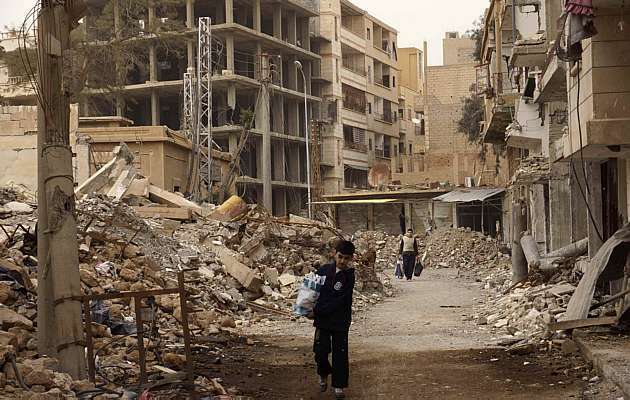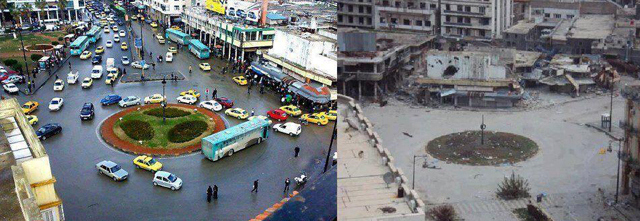President Bashar AL-Assad took over the government of Syria after the death of his father Hafez AL-Assad who ruled the country for more than three decades. His rise to power on July 11, 2000 generated great expectations among the population who were waiting for the end of a dictatorial government imposed by his father.
After some political reforms and promises of change, Bashar pursued a policy as authoritarian as that of the previous president.
Index
- Historical context
- Causes of Civil War in Syria
- Aftermath of the Civil War in Syria
Historical context
In 2011 a wave of popular revolutions spread across some Arab countries, the episode known as the Arab Spring had as aim to overthrow authoritarian governments that were characterized by the centralization of power in the hands of a single person or group political.
Countries such as Egypt, Tunisia, Libya, Syria and Yemen were devastated by a serious economic crisis that caused an increase in the rate of unemployment and food shortages, the lack of a democratic government increased the population's discontent with the political regime deployed. The organization of popular movements that erupted across the Arab territory in the form of protests contributed to the fall of dictatorial governments in four countries: Egypt, Tunisia, Libya and Yemen.
The presidents of Egypt and Tunisia offered no resistance and abandoned their positions, while Muammar Gaddafi of Libya was killed after a military action that had the participation of NATO. In Yemen, President Saleh resisted popular forces for three months before giving up his position to a provisional president.
Tunisia, after holding elections, is moving towards the strengthening of a democratic government and Egypt, despite the fall of the dictator Hosni Mubarak, continues to face political problems.
Causes of Civil War in Syria
In 2012, after pressure from popular movements calling for elections in Egypt, the military that commanded the country since Arab Spring allowed the electoral process, however, the elected president Mohammed Morsi was deposed after a military coup in 2013. Abdel Fattah al-Sissi took over the government and imposed a political regime that further exacerbates social inequalities and benefits only the Egyptian elite.

Among those involved in the Arab Spring, a Syria it was the only country that failed to overthrow its leader: Bashar al-Assad remains firm and subjecting the Syrian population to one of the most regrettable regimes in history. One of the characteristics of countries that are ruled by dictators is the immense social inequality that plagues the population.
Authoritarian presidents often govern to ensure their own benefits, corruption and political persecution too it is one of its hallmarks as the greater part of society has succumbed to poverty, unemployment, illiteracy and lack of freedom.

When Bashar AL-Assad took office on July 11, 2000, he rekindled the people's hope of seeing the Syria freed from an oppressive regime instituted by Hafez AL-Assad during his more than thirty years in office.
The country lived in a State of Emergency, which gave the government the right to interfere in the civil rights of the population for the benefit of the state, there was a strong censorship that prevented the Syrians from expressing their discontent political.
President Bashar took over with a promise to modernize the country and promote a democratic opening, but that's not what happened, he continued to lead Syria with an iron fist following the example of his father.
- Free Online Inclusive Education Course
- Free Online Toy Library and Learning Course
- Free Online Math Games Course in Early Childhood Education
- Free Online Pedagogical Cultural Workshops Course
In 2011, the protests that started the Arab Spring motivated some groups inside Syria to fight the Bashar government. Among other things, the “rebels” called for the president's departure, an end to the dictatorial regime and investigations into cases of corruption involving the highest levels of government.
The protests began peacefully, but the government's violent policy of fighting against demonstrators made the protests more offensive. The Syrian president ordered the extermination of any revolutionary focus, the troops defending the government initiated a series of arrests and repressive movements that tried to put an end to the protests.

Aftermath of the Civil War in Syria
The beginning of conflicts in Syria stimulated the formation of the Free Syrian Army that sought to fight the troops of government, the increase in clashes has caused the Red Cross and the UN to elevate conflicts to the status in Civil war.
The war has been going on for four years, the civilian population is the most affected, around 191,000 people have died since its inception. Intensifying the death toll and restricting access to food is part of one of the president's strategies to end opposition to his government.
Faced with denunciations by the international community of the massacre carried out by troops allied with Bashar, the president claims that the army is facing terrorist groups and denies the death order to civilians. International groups that defend human rights are putting pressure on the UN to have the Syrian president convicted in an international court for the crimes committed against the civilian population.
The Civil War generated in Syria one of the most serious humanitarian crises in world history. In addition to suffering from clashes between the government army and the free Syrian army, the population has been frightened by the growth of a feared terrorist organization: the Islamic state.
The terrorist group believes it is a descendant of Muhammad and its actions combine military strategies and religious ideas, the intention is to take advantage of the crisis in the country to dominate the entire region. Many Syrian and Iraqi cities were once dominated by the Islamic State, the imposition of fear has become the most used measure to achieve its goals.

The war caused important transformations in Syria's social structures, fearing the advance of the Islamic State and government repression, many cities have been abandoned and people in search of help have migrated to refugee camps within the country or sought refuge in other countries. neighbors.
Lebanon, Turkey, Greece and several other European countries have become destinations for refugees. The interference of countries like the United States and England in the Syrian question took the form of embargoes economic and political, which generated criticism from the UN that expected stronger measures against the government of Bashar.

The increase in the migratory flow has been causing concern in Syria's neighboring countries, around four million Syrians have left the country, many entered Europe illegally from the Mediterranean, several countries in the European community have been analyzing applications of political asylum, some European leaders fear that the population swell caused by migration could lead to a serious crisis. economic.
The crossing to Europe has caused the death of thousands of refugees, in April 2015 a boat sank off the European coast leaving 700 dead. The episode alerted the European Union, which since then has been discussing measures to help migrants and alleviate a little Greece and Italy, which until then are the countries that received the most refugees.

President Bashar AL-Assad took over the government of Syria after the death of his father Hafez AL-Assad who ruled the country for more than three decades. His rise to power on July 11, 2000 generated great expectations among the population who were waiting for the end of a dictatorial government imposed by his father. After some political reforms and promises of change, Bashar pursued a policy as authoritarian as that of the previous president.
Lorena Castro Alves
Graduated in History and Pedagogy
The password has been sent to your email.

